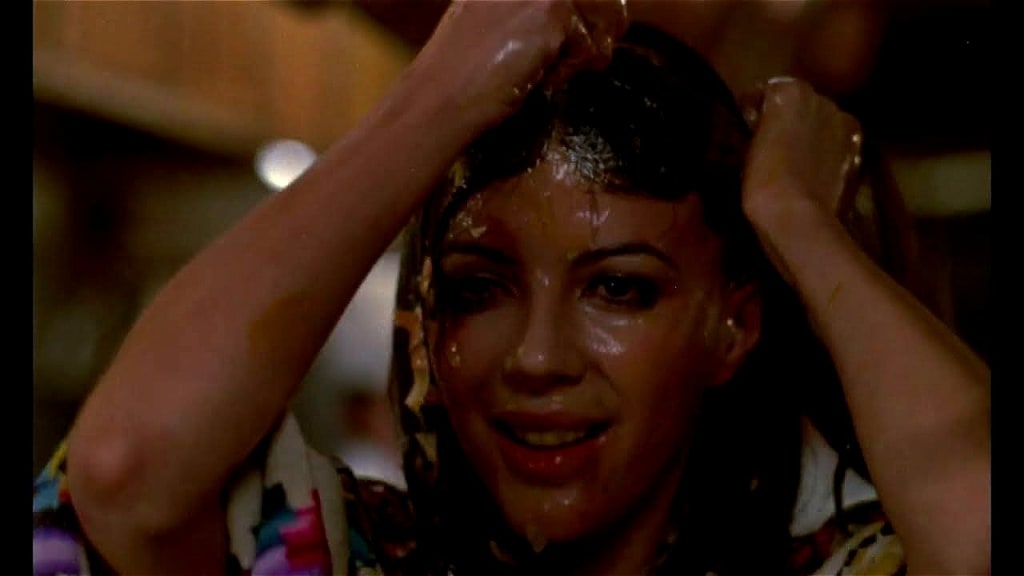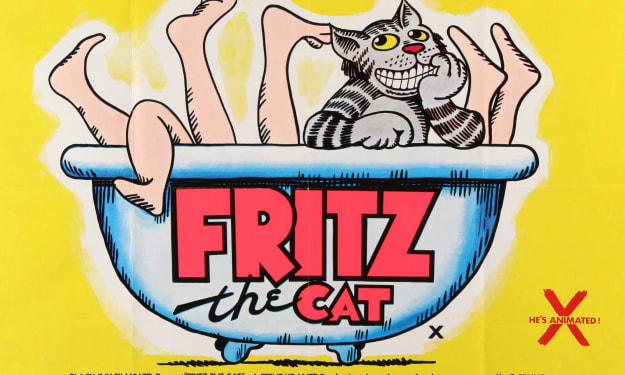
Cult Films and Midnight Movies
"From High Art to Low Trash" Vol 1
By
Tom Baker
I have seen Dušan Makavejev's The Sweet Movie several times, and this brilliant, provocative cinematic journey has offered me something new each time. Part Fellini, part Jodorowsky, and all satire, it is nonetheless an appalling film, the film hinting at the depraved depths of belief, faith, and self-sacrifice in the face of diminished returns--or even disillusionment. It follows along dual narrative pathways.
Its opening salvo is a woman singing loudly in Slavic that she "sees a sight on a distant hill. Is it my love, or is it just bullshit?" This is the lynchpin, the central theme: what separates love from truth, falsity, and faith? What is it we can be seduced into, in this, the "best of all possible worlds"? Voltaire proclaimed, "Those who can get you to accept absurdities can induce you to commit atrocities." Or something to that regard.
The "Miss World" competition is a test of virginity. An embarrassed little doctor examines the splayed orifices of Miss Congo, Miss Yugoslavia, Miss Rhodesia--you get the idea. The winner marries the lavishly wealthy son of the elderly hostess (Jane Mallett), who is a woman making a fortune selling "chemical chastity belts"--maybe saltpeter, the viewer isn't certain. Her son is a stereotypical ultra-wealthy caricature, "Mr. Kapital (John Vernon), a laughing, obnoxious boor who smokes a pipe carved with Lenin's face. He insists, laughing, that Lenin "shot the Czar, right in the face, starting World War 1." Of course, in his ignorance he has confused V.I. Lenin with Gavrilo Princeps, who shot Archduke Franz Ferdinand in Sarajevo in 1914, beginning the conflict that would erupt later as World War 1.
"Mr. Kapital" lives on an estate with several men who seem to be Russian Orthodox clergy, suggestive of the face of religious hypocrisy, the twin Mephistos of God and Mammon. He is celebrated by their playing of music. His new paramour (Carole Laure), however, far from extolling the virtues of living with this cartoon capitalist is horrified to see his solid gold member, which he uses to urinate all over her after a strange ritual of wiping her down with a cloth.
She is sloughed off onto a massive black bodyguard (Roy Callender), a bodybuilder with a flawless physique, who abuses her, brags about being a clinically diagnosed psychopath, and whom she insults in contradictory terms, calling him first a "fascist" then a "dirty commie." He puts her entire body into a large suitcase and ships her to Paris.
In Paris, she meets the stereotypical Mexican romantic hero and crooner "El Macho" (Sami Frey), and, making love in the streets, becomes physically joined to the point where Macho can't "extricate" himself. A group of nuns is conveniently there to lend assistance.
Eventually, she ends up at an artist's commune, a place of vulgar and swinish lewdness and sickening practices. We won't go into detail; the viewer is encouraged, as much as he or she can be, to experience this for themselves. A man, for instance, is "reborn" as an infant. Nudity, bodily functions, the full nine yards--all are freely displayed here. It gives Pasolini's Salo a run for its money.
The final leg of the journey, for Miss Monde, as it were, is back in a television studio, degrading herself, the moral being a critic of the excesses of capitalism and the search for meaning and "truth" amid false hope, false ideals, the riotous and nauseating behavior of the commune a testament to the pig-like excess of a society "gorge to puking" on its bile. But, finally, she's willing to sell herself again and again, in the end. Seduced, as it were, by the glare of the television lens, and the sickening sweet lure of success.
Sweet Movie - Interpreting Extreme Surrealism
The second narrative has a ramshackle boat with a papier-mache image of Marx on the prow sailing through the waters of Amsterdam, guided by Planeta, a communist revolutionary, "Planeta" (Anna Prucnal) who seduces a young Soviet sailor named "Potemkin" (Pierre Clémenti) to come aboard. She tells him that if he falls in love with her (she who embodies the Revolution that failed), she will kill him. They writhe in a bed of sugar, and things turn very bloody indeed.
The ship is crowned by a ramshackle lean-to, hammered together from rotten boards, suggesting poverty and want. (The soundtrack of the film, incidentally, is old revolutionary communist songs, sad Russian ballads, Slavic songs, Spanish balladeering, and snatches of musique concrete, all put to good use here. There are even contemporary English pop ballads of vast inscrutability.)
The most controversial scenes hint at the seduction of children--the film probably walks a legal tightrope in that regard, and we understand some countries have banned it (initially banned in the United States in 1974, that ban has been rescinded and the film has been released on home video and shown in art house theaters). The scenes in question portray an allegory of the seduction of the innocent by the "sweets" of the communist doctrine--the ship, below deck, is laid out with candy, and Planeta writhes seductively, bare-breasted.
We can't go much further in the description.
Make no mistake: this film is not for easy digestion. It is raw in its documentation of human excess and its estimation (however oblique) of the human condition. The film excoriates the temptations of both capitalistic excess, phony materialism, and the arrogance and stupidity of the ruling elite, their base cruelty and exploitation of men and women and Nature, and balances this sickening "sweet" against the impoverished values of communism, that which seduces the young with the candy-colored promises of a proletarian utopia, essentially abusing their naive trust in an act that seems suspiciously like rape.
In the end, we see scenes of the Katyn Forest Massacre, ten thousand men exhumed, this time by the Germans, their dead bodies a horrid, stark contrast to the colorful, vibrant, and often grotesque but playful film into which the documentary footage has been added. This seems to point the finger of accusation at the Soviet beast, and it may be why the giant image of Marx on the prow of Planeta's candy-conveying boat appears to weep.
In the end, the children are brought forth wrapped in plastic. Planeta is arrested by modern, real-world police as it is assumed the witch has murdered the babes. But then, an elevated train roars by, the machinery f Life, and the children rise from their deaths; the sound of the train the industrial cry of their New Birth, as life and thought and hope begins anew.
It is here The Sweet Movie ends. If it can be said to end.
If the viewer can ever shake it.
SWEET MOVIE Trailer
About the Creator
Tom Baker
Author of Haunted Indianapolis, Indiana Ghost Folklore, Midwest Maniacs, Midwest UFOs and Beyond, Scary Urban Legends, 50 Famous Fables and Folk Tales, and Notorious Crimes of the Upper Midwest.: http://tombakerbooks.weebly.com






Comments (1)
Sounds fascinating. I'm not quite sure I could handle the mixture of the lurid & the grotesque, but it sounds extremely interesting. Thanks for the review, Tom.